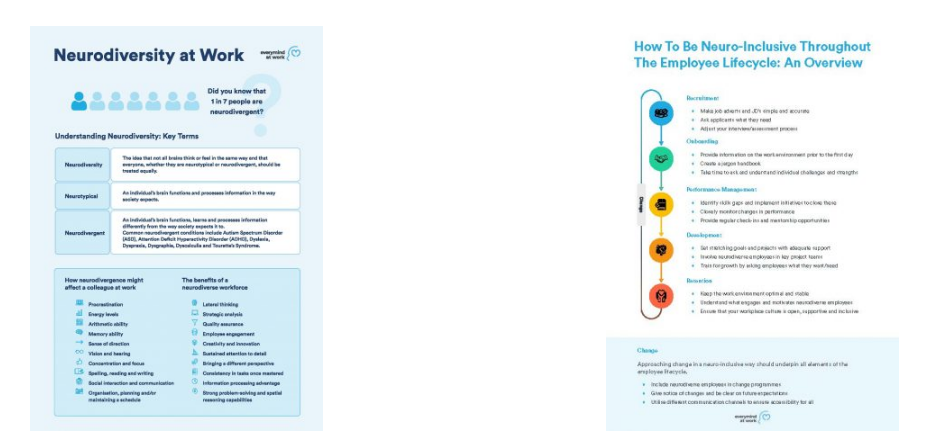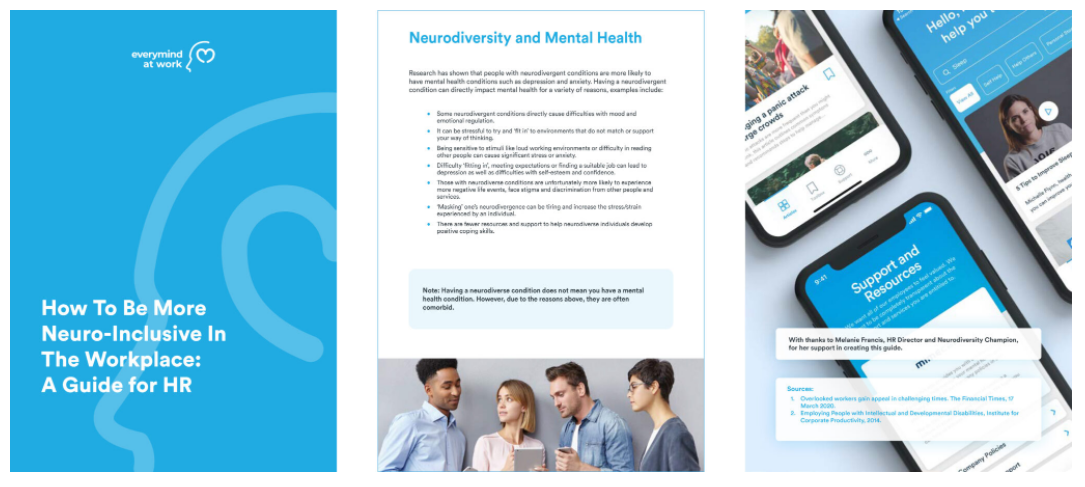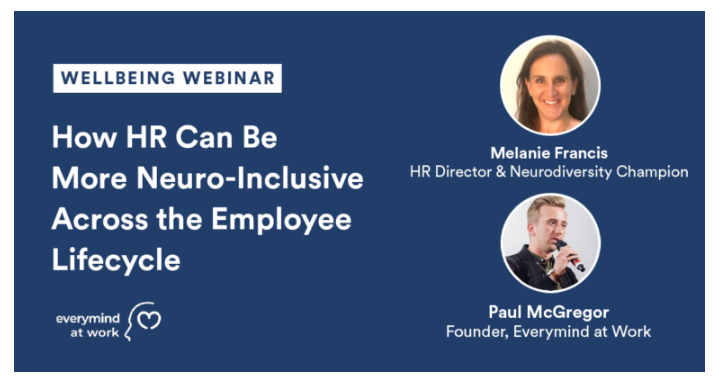To be truly neuro-inclusive in the workplace, employers need to increase the awareness and knowledge of neurodiversity for all employees and appreciate the individuality of neurodiverse conditions so that they can provide adequate support. We understand that it can be challenging to know where to start, so this article and the attached resources are here to provide you with an overview of neurodiversity and its effects on mental health and work, as well as what you can do throughout the employee lifecycle to create and support a diverse workforce.
Understanding Neurodiversity
What is Neurodiversity?
Neurodiversity refers to the idea that not all brains think or feel in the same way and that everyone, whether they are neurotypical or neurodivergent, should be treated equally. Most people are neurotypical, meaning that the brain functions and processes information in the way society expects. However, it is estimated that around 1 in 7 people are neurodivergent, meaning that the brain functions, learns and processes information differently. This accounts for more than 15% of the general population.
Neurodiversity includes everyone and we all have neurological differences. However, individuals with neurodivergent traits may meet a diagnostic threshold for neurodivergent conditions such as Autism Spectrum Disorder (ASD), Attention Deficit Hyperactivity Disorder (ADHD), Dyslexia, Dyspraxia, Dysgraphia, Dyscalculia and Tourette’s Syndrome.
“If you have met one person with autism, you have met one person with autism.”
This saying applies to all neurodivergent individuals, not just those with Autism. Each form of neurodivergence has a range of associated characteristics and these can vary from individual to individual and can change over time. It is also common for an individual to have the characteristics of more than one type of neurodivergence.
Therefore, to create a truly inclusive environment, we need to increase our awareness and knowledge of neurodiversity and appreciate the individuality of neurodiverse conditions so that we can support all employees.
Neurodiversity and Mental Health
Research has shown that people with neurodivergent conditions are more likely to have mental health conditions such as depression and anxiety. Having a neurodivergent condition can directly impact mental health for a variety of reasons, examples include:
- Some neurodivergent conditions directly cause difficulties with mood and emotional regulation.
- It can be stressful to try and ‘fit in’ to environments that do not match or support your personal thought process or way of thinking.
- Being sensitive to stimuli like loud working environments or difficulty in reading other people can cause significant stress or social anxiety disorders.
- Difficulty ‘fitting in’, meeting expectations or finding a suitable job can lead to depression as well as difficulties with self-esteem and confidence.
- Those with neurodiverse conditions are unfortunately more likely to experience more negative life experiences and face stigma and discrimination from other people and services.
- ‘Masking’ one’s neurodivergence can be tiring and increase the stress/strain experienced by an individual.
- There are fewer resources and support to help neurodiverse individuals develop positive coping skills and wellbeing strategies.
Note: Having a neurodiverse condition does not mean you have a mental health condition. However, due to the reasons above, they are often comorbid.
How Neurodivergence Can Affect Employees at Work
Workplaces are typically built for neurotypical conformity and are ill-equipped for neurodivergence. This means that many work environments and practices do not support neurodiverse employees. However, due to the lack of awareness and knowledge surrounding neurodiversity, employers and many managers do not understand the ways in which a neurodiverse condition may negatively impact an individual at work.
Without going into the specific details of each neurodiverse condition and acknowledging that every individual is different, we have listed below some areas that may be impacted by neurodivergence at work.
10 areas that may be impacted by neurodivergence at work:
(1) Concentration and focus
(2) Procrastination
(3) Energy levels
(4) Interpersonal communication, interaction and social skills
(5) Spelling, reading and writing
(6) Arithmetic ability
(7) Organisation, planning and/or maintaining a schedule
(8) Memory ability
(9) Sense of direction
(10) Vision and hearing
The Benefits of Neurodiversity In The Workplace
Whilst ill-equipped workplaces can pose significant challenges to neurodiverse employees, when supported correctly, neurodiverse talent can significantly increase the competitive advantage of an organisation.
Traits commonly seen in neurodiverse people include empathy, creativity, persistence, imagination, energy, problem-solving, pattern recognition and analytical skills. This means that having neurodiverse teams can bring great talent, perspective and skills that may not be achieved by neurotypical employees alone. Thus providing companies with a competitive edge that brings both financial and cultural benefits.
These benefits occur as neurodiverse employees bring:
- Creativity and innovation
- Lateral thinking
- Strategic analysis
- Bringing a ‘different perspective’
- Strong problem-solving and spatial reasoning capabilities
- Consistency in tasks once mastered
- Sustained attention to detail
- Information processing advantage
- Quality assurance
- Employee engagement
Insightful Statistics
JPMorgan Chase reports that professionals in its Autism at Work initiative make fewer errors and are 90% to 140% more productive than neurotypical employees.*
Dependability, motivation, engagement and peer integration: at least 86% of employers rated employees with neurodiverse conditions as good or very good in all four areas.**
Neurodiversity & The Law
Whilst there is a moral and business case for being a neuro-inclusive employer, there is also a legal one that all organisations should be aware of.
Although many neurodivergent workers will not think of themselves as being disabled, it is likely that they will satisfy the legal definition of disability and are therefore protected under the Equality Act 2010 against discrimination, victimisation and harassment. It also means that neurodivergent workers have the right to reasonable adjustments at work.
Potential reasonable adjustments
It is important to understand what the individuals’ challenges and strengths are so that you can support employees appropriately. For example, are there any tools that might be useful to enable them to shine in their role or encourage higher productivity and performance? This is where you can consider making simple adjustments to support individual needs. Examples include, but are not limited to:
- Inclusive technology options – like colour filters for screens, noise canceling headphones or assistive text software
- Flexible working, incluidng work hours and/or locations
- Providing written summaries of meetings or allowing for recordings
- Frequent breaks
- Job design – e.g. the employee may prefer one task at a time versus multiple tasks
- Work environment considerations e.g. quieter space or providing a balance chair to allow for more movement when seated

How To Be Neuro-Inclusive Throughout The Employee Lifecycle
To be a neuro-inclusive employer, you need to consider proactive steps you can take throughout the employee lifecycle (from the hiring process to retention) that will support the needs of all your employees.

Workplace accommodations for neurodiverse employees
We understand that it can be challenging to know where to start, so we have outlined three considerations for each stage of the employee lifecycle that would support neurodiversity in the workplace. Approaching change in a neuro-inclusive way is key, and should underpin all elements of the employee lifecycle.
P.S. Making simple workplace adjustments can make a significant difference to neurodivergent people. The full HR guide goes into much more detail for each of the tips mentioned below!
Hiring neurodiverse employees
The recruitment process should focus on getting the right people in the right roles. To ensure you are getting the best from neurodivergent employees, you need to ensure that your recruitment process is neuro-inclusive. This also highlights to potential employees that you support neurodiversity in the workplace. Here are three ways you can do this:
Tip 1: Make job adverts and job descriptions simple and accurate
Tip 2: Ask applicants what they need
Tip 3: Adjust your assessment/interview process
Onboarding
Starting a new role can be daunting and anxiety-provoking for any individual, but particularly more so for those who are neurodivergent. To make onboarding more neuro-inclusive, here are three implementations you may want to consider:
Tip 1: Provide information on the work environment prior to the first day
Tip 2: Create a jargon handbook
Tip 3: Take time to ask and understand individual challenges and strengths
Performance Management
Quite often, neurodivergent individuals face formal capability procedures unnecessarily because the organisations’ processes and performance evaluations are not inclusive of the neurodivergent community. Here are three ways you can provide support to your neurodivergent employees to enhance performance to benefit both the individual and the business:
Tip 1: Identify skills gaps and implement initiatives to close these
Tip 2: Closely monitor changes in performance
Tip 3: Provide regular check-ins and mentorship opportunities
Development
Employee development aims to improve the skills and knowledge of employees and if done correctly can improve retention. It is therefore important to consider whether the development activities and learning opportunities are engaging, motivating and inclusive for neurodivergent employees.
Tip 1: Set stretching goals and projects with adequate support
Tip 2: Involve neurodiverse employees in key project teams
Tip 3: Train for growth by asking employees what they want/need
Retention
Effective employee retention is key to business success and it is important to recognise that there is no ‘one size fits all’ approach here. Here are three things you can do to increase the retention of your neurodiverse talent:
Tip 1: Keep the work environment optimal and stable
Tip 2: Understand what engages and motivates neurodiverse employees
Tip 3: Ensure that your workplace culture is open, supportive and inclusive
Change
Approaching change in a neuro-inclusive way should underpin all elements of the employee lifecycle. Change is inevitable within organisations, however, it can be a huge source of anxiety or distress for neurodiverse colleagues. It is therefore important to capture their needs when carrying out any form of change, whether at an organisation or local level as the smallest amount of change may negatively impact employees.
Tip 1: Include neurodiverse employees in change programmes
Tip 2: Give notice of changes and be clear on future expectations
Tip 3: Utilise different communication channels to ensure accessibility for all
Additional Resources
To download our summary poster of how to be neuro-inclusive throughout the employee lifecycle, click here.
We also have an awareness poster that can be shared with your employees, you can download it here.

To access the full HR Guide on How To Be More Neuro-Inclusive In The Workplace, click here.

Finally, in case you missed it, you can watch the Neurodiversity webinar replay by simply clicking here!

Sources:
*Overlooked workers gain appeal in challenging times. The Financial Times, 17 March 2020.
**Employing People with Intellectual and Developmental Disabilities, Institute for Corporate Productivity, 2014.








